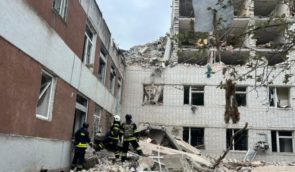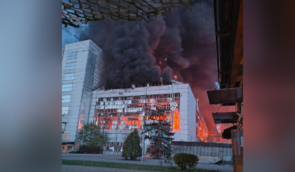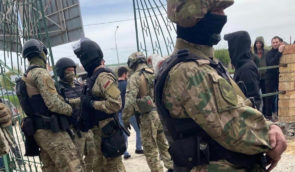ATR Television Channel to be Reopened as Internet Media
Normal
0
false
false
false
RU
X-NONE
X-NONE
/* Style Definitions */
table.MsoNormalTable
{mso-style-name:”Обычная таблица”;
mso-tstyle-rowband-size:0;
mso-tstyle-colband-size:0;
mso-style-noshow:yes;
mso-style-priority:99;
mso-style-qformat:yes;
mso-style-parent:””;
mso-padding-alt:0cm 5.4pt 0cm 5.4pt;
mso-para-margin-top:0cm;
mso-para-margin-right:0cm;
mso-para-margin-bottom:10.0pt;
mso-para-margin-left:0cm;
line-height:115%;
mso-pagination:widow-orphan;
font-size:11.0pt;
font-family:”Calibri”,”sans-serif”;
mso-ascii-font-family:Calibri;
mso-ascii-theme-font:minor-latin;
mso-fareast-font-family:”Times New Roman”;
mso-fareast-theme-font:minor-fareast;
mso-hansi-font-family:Calibri;
mso-hansi-theme-font:minor-latin;}
The Crimean Tatar television channel ATR, which ceased broadcasting on April 1 because of repeated rejections by the Russian government to re-register under Russian law, resumed its work.
As ATR’s Deputy Director General for Information Policy, Lilya Budzhurova, told Telekritika, the news agency will publish new stories daily on the channel’s website. They will work out of Simferopol.
Budzhurova said that, during the six weeks which the channel could not broadcast, the ATR team was preparing documentary projects. The documentaries are on Crimean Tatars who were children during WWII and the deportations as well as the first repatriates. Their journalists also prepared special reports and stories which have been published on the site.
“After completing this work, we waited until our lawyers finished studying the situation regarding working on the Internet. As a result, we have chosen to present information through a website. ATR will publish stories in the format of real time news. The Russian legislation has placed restrictions on that as well. They have a formalized set of rules. Our content must not look like it is connected to television broadcasting. For example, the video may not have like such words as “on air today” or “in our program,” and there cannot be recordings from a studio. At the same time, spreading information is allowed because modern websites have long been multimedia. Therefore, this is what we will do,” explained Budzhurova.
She noted that the channel will produce the same amount of video content as when ATR was working on the air. The news release will consist of 12 subjects. At the same time, she stressed that ATR reporters are being hindered in the collection of information by authorities denying them accreditation.
“We are trying to reach our normal output, but we do not always manage. Because we have problems with accreditation, we are not allowed everywhere. Going outside and filming, thank God, is not a problem for us, but getting accredited into the Crimean parliament or Council of Ministers does not work. Yes, we don’t have a broadcasting license or registration with Roskomnadzor [Russian Federal Service for Supervision of Communications, Information Technology, and Mass Media], but the spreading of information on the internet does not require them. Therefore, we will be strongly working to convince everyone that we have the right to attend all of the important events in Crimea, including official ones. We are giving a signal to our audience: we are here and we are alive and well,” said Budzhurova.
Not one employee has left the channel after it ceased broadcasting. Only one cannot get to work, a cameraman named Eskender Nebiev, who the Crimean occupying power searched and detained on April 20 in the so-called “case of February 26.” On April 22, the court arrested Nebiev for two months.
Lilya Budzhurova also refuted a statement by Roskomnadzor head Alexander Zharov, who said that ATR has been disconnected on the initiative of the owners of the channel, not the Russian government, because it filed “incomplete” documents on four occasions. According to her, they submitted a complete package of documents each time and are, once again, waiting for a response from Roskomnadzor.
“We submitted a complete set of documents every time. Now have submitted it for the fifth time. What they are demanding is nonsense. For example, they are asking for a certificate that our co-founder is over 17 years old, even though the documents have his date of birth. Next time, perhaps they will ask for a certificate that he is not sick with smallpox. As far as I know, until the end of April, Roskomnadzor once again had to examine ATR’s documents. Our people in Moscow said that our package, yet again, was left without consideration. But, we have not yet received the written notification,” said Budzhurova.
On April 1, not only was ATR shut down, but so were its sister channels owned by the same production company. This includes Lale, a children’s TV channel, and the radio stations Meydan and Leader.
On March 19, the self-proclaimed head of the occupying power of Crimea, Sergey Aksyonov, said that “during near-warlike conditions,” the work of channels such as ATR is unacceptable.
On April 1, President Petro Poroshenko instructed the Ukrainian Ministry of Information Policy to create favorable conditions for ATR to work in Ukraine.
At the same time, the management of ATR’s parent company says that it still hopes to re-register under Russian law and continue broadcasting in Crimea.
On April 23, the so-called “prime minister,” Sergey Aksyonov, signed a decree establishing the “Public Crimean Tatar Television and Radio Company” (OKTRK), which is planned to be allocated more than 177 million rubles (about 79 million UAH) from the federal budget. On April 27, it became known that the new pro-government Crimean Tatar television station will be called “Millet,” while the radio station will be named “Vetan.”








